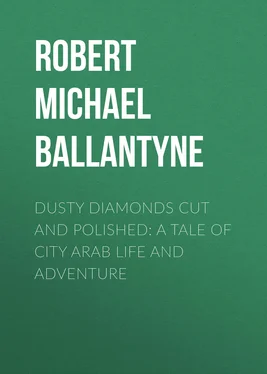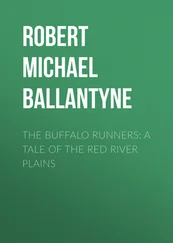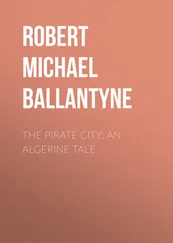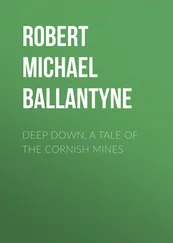Robert Michael Ballantyne - Dusty Diamonds Cut and Polished - A Tale of City Arab Life and Adventure
Здесь есть возможность читать онлайн «Robert Michael Ballantyne - Dusty Diamonds Cut and Polished - A Tale of City Arab Life and Adventure» — ознакомительный отрывок электронной книги совершенно бесплатно, а после прочтения отрывка купить полную версию. В некоторых случаях можно слушать аудио, скачать через торрент в формате fb2 и присутствует краткое содержание. Жанр: Детские приключения, literature_19, foreign_antique, foreign_prose, foreign_children, на английском языке. Описание произведения, (предисловие) а так же отзывы посетителей доступны на портале библиотеки ЛибКат.
- Название:Dusty Diamonds Cut and Polished: A Tale of City Arab Life and Adventure
- Автор:
- Жанр:
- Год:неизвестен
- ISBN:нет данных
- Рейтинг книги:5 / 5. Голосов: 1
-
Избранное:Добавить в избранное
- Отзывы:
-
Ваша оценка:
- 100
- 1
- 2
- 3
- 4
- 5
Dusty Diamonds Cut and Polished: A Tale of City Arab Life and Adventure: краткое содержание, описание и аннотация
Предлагаем к чтению аннотацию, описание, краткое содержание или предисловие (зависит от того, что написал сам автор книги «Dusty Diamonds Cut and Polished: A Tale of City Arab Life and Adventure»). Если вы не нашли необходимую информацию о книге — напишите в комментариях, мы постараемся отыскать её.
Dusty Diamonds Cut and Polished: A Tale of City Arab Life and Adventure — читать онлайн ознакомительный отрывок
Ниже представлен текст книги, разбитый по страницам. Система сохранения места последней прочитанной страницы, позволяет с удобством читать онлайн бесплатно книгу «Dusty Diamonds Cut and Polished: A Tale of City Arab Life and Adventure», без необходимости каждый раз заново искать на чём Вы остановились. Поставьте закладку, и сможете в любой момент перейти на страницу, на которой закончили чтение.
Интервал:
Закладка:
Before the human stream had got quite across, an impatient hansom made a push. The eagle eye of Number 666 had observed the intention, and in a moment his gigantic figure stood calmly in front of the horse, whose head was raised high above his helmet as the driver tightened the reins violently.
Just then a small slipshod girl made an anxious dash from refuge-island, lost courage, and turned to run back, changed her mind, got bewildered, stopped suddenly and yelled.
Giles caught her by the arm, bore her to the pavement, and turned, just in time to see the hansom dash on in the hope of being overlooked. Vain hope! Number 666 saw the number of the hansom, booked it in his memory while he assisted in raising up an old gentleman who had been overturned, though not injured, in endeavouring to avoid it.
During the lull—for there are lulls in the rush of London traffic, as in the storms of nature,—Giles transferred the number of that hansom to his note-book, thereby laying up a little treat for its driver in the shape of a little trial the next day terminating, probably, with a fine.
Towards five in the afternoon the strain of all this began to tell even on the powerful frame of Giles Scott, but no symptom did he show of fatigue, and so much reserve force did he possess that it is probable he would have exhibited as calm and unwearied a front if he had remained on duty for eighteen hours instead of eight.
About that hour, also, there came an unusual glut to the traffic, in the form of a troop of the horse-guards. These magnificent creatures, resplendent in glittering steel, white plumes, and black boots, were passing westward. Giles stood in front of the arrested stream. A number of people stood, as it were, under his shadow. Refuge-island was overflowing. Comments, chiefly eulogistic, were being freely made and some impatience was being manifested by drivers, when a little shriek was heard, and a child’s voice exclaimed:—
“Oh! papa, papa—there’s my policeman—the one I so nearly killed. He’s not dead after all!”
Giles forgot his dignity for one moment, and, looking round, met the eager gaze of little Di Brandon.
Another moment and duty required his undivided attention, so that he lost sight of her, but Di took good care not to lose sight of him.
“We will wait here, darling,” said her father, referring to refuge-island on which he stood, “and when he is disengaged we can speak to him.”
“Oh! I’m so glad he’s not dead,” said little Di, “and p’raps he’ll be able to show us the way to my boy’s home.”
Di had a method of adopting, in a motherly way, all who, in the remotest manner, came into her life. Thus she not only spoke of our butcher and our baker, which was natural, but referred to “my policeman” and “my boy” ever since the day of the accident.
When Giles had set his portion of the traffic in harmonious motion he returned to his island, and was not sorry to receive the dignified greeting of Sir Richard Brandon, while he was delighted as well as amused by the enthusiastic grasp with which Di seized his huge hand in both of her little ones, and the earnest manner in which she inquired after his health, and if she had hurt him much.
“Did they put you to bed and give you hot gruel?” she asked, with touching pathos.
“No, miss, they didn’t think I was hurt quite enough to require it,” answered Giles, his drooping moustache curling slightly as he spoke.
“I had hoped to see you at my house,” said Sir Richard, “you did not call.”
“Thank you, sir, I did not think the little service I rendered your daughter worth making so much of. I called, however, the same evening, to inquire for her, but did not wish to intrude on you.”
“It would have been no intrusion, friend,” returned Sir Richard, with grand condescension. “One who has saved my child’s life has a claim upon my consideration.”
“A dook ’e must be,” said a small street boy in a loud stage whisper to a dray-man—for small street-boys are sown broadcast in London, and turn up at all places on every occasion, “or p’raps,” he added on reflection, “’e’s on’y a markiss.”
“Now then,” said Giles to the dray-man with a motion of the hand that caused him to move on, while he cast a look on the boy which induced him to move off.
“By the way, constable,” said Sir Richard, “I am on my way to visit a poor boy whose leg was broken on the day my pony ran away. He was holding the pony at the time. He lives in Whitechapel somewhere. I have the address here in my note-book.”
“Excuse me, sir, one moment,” said Number 666, going towards a crowd which had gathered round a fallen horse. “I happen to be going to that district myself,” he continued on returning, “what is the boy’s name?”
“Robert—perhaps I should rather say Bobby Frog,” answered Sir Richard.
“The name is familiar,” returned the policeman, “but in London there are so many—what’s his address, sir,—Roy’s Court, near Commercial Street? Oh! I know it well—one of the worst parts of London. I know the boy too. He is somewhat noted in that neighbourhood for giving the police trouble. Not a bad-hearted fellow, I believe, but full of mischief, and has been brought up among thieves from his birth. His father is, or was, a bird-fancier and seller of penny articles on the streets, besides being a professional pugilist. You will be the better for protection there, sir. I would advise you not to go alone. If you can wait for five or ten minutes,” added Giles, “I shall be off duty and will be happy to accompany you.”
Sir Richard agreed to wait. Within the time mentioned Giles was relieved, and, entering a cab with his friends, drove towards Whitechapel. They had to pass near our policeman’s lodgings on the way.
“Would you object, sir, stopping at my house for five minutes?” he asked.
“Certainly not,” returned the knight, “I am in no hurry.”
Number 666 stopped the cab, leaped out and disappeared through a narrow passage. In less than five minutes a very tall gentlemanly man issued from the same passage and approached them. Little Di opened her blue eyes to their very uttermost. It was her policeman in plain clothes!
She did not like the change at all at first, but before the end of the drive got used to him in his new aspect—all the more readily that he seemed to have cast off much of his stiffness and reserve with his blue skin.
Near the metropolitan railway station in Whitechapel the cab was dismissed, and Giles led the father and child along the crowded thoroughfare until they reached Commercial Street, along which they proceeded a short distance.
“We are now near some of the worst parts of London, sir,” said Giles, “where great numbers of the criminal and most abandoned characters dwell.”
“Indeed,” said Sir Richard, who did not seem to be much gratified by the information.
As for Di, she was nearly crying. The news that her boy was a thief and was born in the midst of such naughty people had fallen with chilling influence on her heart, for she had never thought of anything but the story-book “poor but honest parents!”
“What large building is that?” inquired the knight, who began to wish that he had not given way to his daughter’s importunities, “the one opposite, I mean, with placards under the windows.”
“That is the well-known Home of Industry, instituted and managed by Miss Macpherson and a staff of volunteer workers. They do a deal of good, sir, in this neighbourhood.”
“Ah! indeed,” said Sir Richard, who had never before heard of the Home of Industry. “And, pray, what particular industry does this Miss Mac— what did you call her?”
Читать дальшеИнтервал:
Закладка:
Похожие книги на «Dusty Diamonds Cut and Polished: A Tale of City Arab Life and Adventure»
Представляем Вашему вниманию похожие книги на «Dusty Diamonds Cut and Polished: A Tale of City Arab Life and Adventure» списком для выбора. Мы отобрали схожую по названию и смыслу литературу в надежде предоставить читателям больше вариантов отыскать новые, интересные, ещё непрочитанные произведения.
Обсуждение, отзывы о книге «Dusty Diamonds Cut and Polished: A Tale of City Arab Life and Adventure» и просто собственные мнения читателей. Оставьте ваши комментарии, напишите, что Вы думаете о произведении, его смысле или главных героях. Укажите что конкретно понравилось, а что нет, и почему Вы так считаете.












